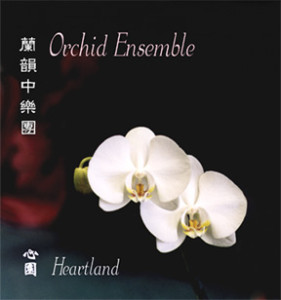Heartland iTune Album Review
 The Vancouver, Canada-based Orchid Ensemble offer a unique perspective to Chinese music apart from other groups of their type. Extending and expounding on ancient traditions, but not necessarily contemporizing them with modern percussion or beats, the trio instead tends to extend established forms with improvisational ideas, acute listening skills, a flair for understated drama, and a sharing of sonic tones unheard in this kind of ethnic fusion. The bowed two-string erhu played by Lan Tung is teamed with the zither-like zheng wielded by Mei Han, while percussionist Jonathan Bernard concentrates on the wooden marimba. They achieve a collective style that is beauteous, sensual, deep, and culturally rich without violating any traditional aesthetic. There’s a suggested suite form utilized during “Lonely Crows Playing in the Winter Stream,” featuring telepathic tempo changes, and an official three-segment piece entitled “Heartland,” which moves from spacy, cerebral long tones to a wafting waltz and a minimal two-note theme that is occasionally deconstructed and decayed. For most of the recording, Tung’s soaring, singing erhu leads out, with the zheng either punctuating and occasionally playing in unison, as the marimba and small percussion sounds act as supportive devices. “Lantern Riddle” most closely represents this division of labor. But the ensemble pulls some rabbits out of the hat, as on the choral-like, cascading, sped-up, stopped, then racing folkish triality of “Fishermen’s Song”; the powerful, horse image-laden “The Gallop”; the spirited country-animated “Harvest Season”; and the languid, romantic Mongolian folk melody “Meeting in the Yurt.” At times Bernard can extract a mysterious shading on his own for “Shepherd Girl” opposite Tung’s curious erhu, while the zheng sets a spatial, pure Asian tone on “New Year’s Eve.” A wonderful combination of spirit, connectedness, and sonic timbres, the Orchid Ensemble deserve wide attention on their own terms and integrity of purpose. They stand unique unto themselves.
The Vancouver, Canada-based Orchid Ensemble offer a unique perspective to Chinese music apart from other groups of their type. Extending and expounding on ancient traditions, but not necessarily contemporizing them with modern percussion or beats, the trio instead tends to extend established forms with improvisational ideas, acute listening skills, a flair for understated drama, and a sharing of sonic tones unheard in this kind of ethnic fusion. The bowed two-string erhu played by Lan Tung is teamed with the zither-like zheng wielded by Mei Han, while percussionist Jonathan Bernard concentrates on the wooden marimba. They achieve a collective style that is beauteous, sensual, deep, and culturally rich without violating any traditional aesthetic. There’s a suggested suite form utilized during “Lonely Crows Playing in the Winter Stream,” featuring telepathic tempo changes, and an official three-segment piece entitled “Heartland,” which moves from spacy, cerebral long tones to a wafting waltz and a minimal two-note theme that is occasionally deconstructed and decayed. For most of the recording, Tung’s soaring, singing erhu leads out, with the zheng either punctuating and occasionally playing in unison, as the marimba and small percussion sounds act as supportive devices. “Lantern Riddle” most closely represents this division of labor. But the ensemble pulls some rabbits out of the hat, as on the choral-like, cascading, sped-up, stopped, then racing folkish triality of “Fishermen’s Song”; the powerful, horse image-laden “The Gallop”; the spirited country-animated “Harvest Season”; and the languid, romantic Mongolian folk melody “Meeting in the Yurt.” At times Bernard can extract a mysterious shading on his own for “Shepherd Girl” opposite Tung’s curious erhu, while the zheng sets a spatial, pure Asian tone on “New Year’s Eve.” A wonderful combination of spirit, connectedness, and sonic timbres, the Orchid Ensemble deserve wide attention on their own terms and integrity of purpose. They stand unique unto themselves.
~ Michael G. Nastos, Rovi
